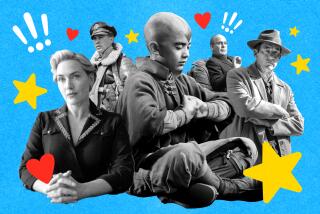Critic’s Pick: TV Picks: ‘Foyle’s War,’ ‘Allegiance,’ ‘The Fall’
“Foyle’s War”
Has “Foyle’s War” finally ended? Seems so, but maybe not. Anthony Horowitz’s perfectly marvelous World War II (and beyond) drama has already had two series finales. In 2007 ITV canceled it after Season 5; it was brought back for Season 6 by popular demand. Then, just two years ago, Horowitz announced that Season 7 would be his last, only to go on to write Season 8, which debuts in the U.S. on Acorn TV.
The three feature-length episodes, pick up right where Season 7 left off and are just as good, if not better, than any of the consistently terrific episodes that went before it.
In 2002, the world met Det. Chief Supt. Christopher Foyle (Michael Kitchen), a World War I veteran longing to join the Second World War effort only to be told he is needed on the home front. Home being Hastings, a charming but crime-riddled town on England’s south coast.
Aided by his trusty driver Sam (Honeysuckle Weeks) and, for early seasons, Det. Sgt. Milner (Anthony Howell), DCS Foyle kept Hastings, and occasionally the world, safe from petty criminals, Nazis, greedy Americans, anthrax, nuclear fallout and other more general corruption.
Eventually the war ended, and so did “Foyle,” until the people spoke; when it came back, Foyle was drafted by MI5, where he and Sam remain.
Always as politically aware as it was historical, the series has become increasingly modern in its themes; among other things, the new episodes deal with oil interests in the Middle East, and tensions between Israelis and Palestinians.
More importantly, the third episode, while offering closure on certain levels, does not feel at all like a final finale. So fans of the show should probably kickstart the Twitter campaign -- #SaveFoyle? -- right about now.
Because seriously, who wants to live in world with out Foyle? Season 8, beginning Feb. 3 on Acorn TV (acorn.tv.com); previous seasons on Acorn and Netflix.
“Allegiance”
The perfect American family turns out to be chock full of Russian spies. Sound familiar? That’s because “The Americans,” which just returned to FX this week, has a similar Cold War connection, if not an identical premise. While the spies in “The Americans” are willing and active if increasingly conflicted, the agents of “Allegiance” fled Russia in an effort to put their KGB past behind them.
Like that’s gonna work.
Now, of course, Mother Russia has come calling and frankly the timing could not be worse. Not only are Katya (Hope Davis) and Mark (Scott Cohan) perfectly happy with their American life, their son Alex (Gavin Stenhouse) is now a CIA analyst specializing in, you guessed it, Russian affairs. (Seriously, all those years to work with and they couldn’t steer him to med school?)
As silly as the set-up sounds, recent tensions with Russia make it less retro and more relevant, at least as a drama examining what can happen when your past catches up to you. More important, Davis, an actor with wide-ranging talents and perfectly aimed intensity, totally sells it.
No, it is not “The Americans,” nor was it meant to be, but with a strong lead who is neither doctor, lawyer nor cop, it’s a potentially good add to the NBC lineup and the broadcast network oeuvre in general. NBC, Thursdays, 10 p.m.
“The Fall”
The second season of the BBC serial killer drama debuted on Netflix on Jan. 16 and it’s a corker. Gillian Anderson stars as the formidably controlled Det. Supt. Stella Gibson brought in to help the Belfast, Northern Ireland, police capture a serial killer, and she is, not surprisingly the reason to watch. Jaimie Dornan, set to star in the alarmingly anticipated “Fifty Shades of Grey,” is also quite good as Paul Spector, the above-mentioned serial killer. A husband, father and grief counselor, Paul made contact with Stella at the end of Season 1.
He was fleeing Belfast at the time, believing Stella’s investigation had come too close. But, of course, he can’t stay away, and as for that investigation, well, let’s just say that for all her vaunted reputation, Stella is required to make many mistakes in order to keep the plot moving.
Not that it matters much. “The Fall” is clearly high drama, from the overly-fetishized crimes to the often operatic staging of various encounters that allow Stella to make her candidly feminist proclamations.
Her performance makes “The Fall” worth watching, as does the realization that it’s not the fairly shocking crimes that make “The Fall” an edgy series. It’s the sight of a woman who sees what others don’t, shares what she sees and refuses to internalize any of the issues roiling around her.
The scene in which Stella finally confronts Paul destroys many of the current conceits so cavalierly accepted in modern crime drama, and about damn time. Netflix, whenever.
More to Read
The complete guide to home viewing
Get Screen Gab for everything about the TV shows and streaming movies everyone’s talking about.
You may occasionally receive promotional content from the Los Angeles Times.







